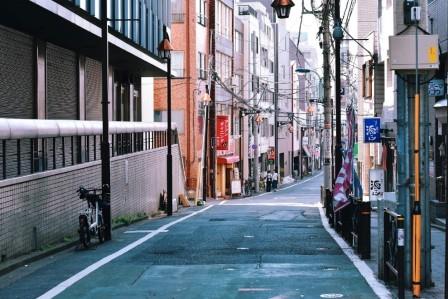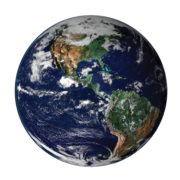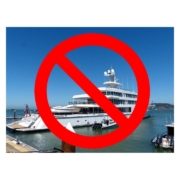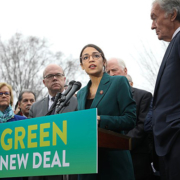Normalizing Outbreaks in the Anthropocene: Growth Isn’t the Cure
By James Magnus-Johnston

Quiet streets in coronavirus epicenters. (Image Source, Credit: Alex Kim)
Death rates. Infection rates. Handwashing. Handwringing.
May I re-frame the coronavirus conversation? Although the world is currently stunned by the rapid spread of this virus across the globe, we must understand that these kinds of outbreaks are simply going to happen more often in our climate-altered world, and they highlight the fragility of our growth-or-bust industrial system. But there is a silver lining: This moment requires industrial societies to emphasize wellbeing over GDP and to witness the vulnerability of global, energy-intensive supply chains. The norm of GDP and economic growth obsessions has been put on hold. Without diminishing human suffering, a few months of reduced industrial output can also demonstrate that a different mode of living is possible; even desirable.
While this outbreak could have a negative impact on people’s sources of income, it has also already cut emissions more quickly than years of climate negotiations. I’ve heard more than one colleague joke that they can’t wait for their employer to close the office so they can work from home.
Some people believe the coronavirus outbreak is but one in a cascade of events that will break industrial society. Whether or not that’s true, the conversations that are catalyzed should be similar: Industrial societies ought to reconsider their cultural and economic goals, especially if routine crashes are baked into the system.
The late economist Richard Douthwaite observed that in our present set of economic institutions, the choice is between growth and collapse, not growth and stability. In reconsidering the current economic system, industrial societies must contemplate the following: If the growth-or-bust imperative is so clearly maladapted to deal with these kinds of consecutive crashes—and crashes are bound to hit more often—why not embrace a more stable economic system that facilitates life-affirming modes of working and being?
Why Outbreaks Will Be More Routine
Environmental breakdown—such as rising temperatures, melting glaciers, and changing precipitation patterns—are contributing to a rise in infectious diseases.
The World Health Organization (WHO) cautions that “worldwide, there is an apparent increase in many infectious diseases… This reflects the combined impacts of rapid demographic, environmental, social, technological, and other changes in our ways-of-living [sic]. Climate change will also affect infectious disease occurrences.”

Scientists recently discovered 28 new virus groups trapped in 15,000-year-old melting ice. (Image Source, Credit: Huzefa Bagwala)
New disease carriers and evolving incubation patterns contribute to the rise in rates of infection. So, too, do changes in land use. For instance, Himalayan glaciers are melting twice as fast as they were half a century ago. One team of scientists recently found 28 novel viral groups in 15,000-year-old melting ice, all of which were entirely new to science. And that amount only accounts for a small fraction of those that will be new to 21st-century humans.
Turning Toward Simplicity and Care
It’s hard to contextualize the present pace of social and environmental change over the long run of history. But it is short-sighted to think merely about death rates or the short-term impact of coronavirus on GDP and the stock market.
Many of the media narratives are, as required by their commercial format, recycling short-term questions. A lot of people are undertaking meaningful, precautious efforts to reduce the spread of the infection; however, headlines and advertisements reveal the illusion that in a growth economy many believe they can buy their way out of this mess by purchasing control mechanisms, such as masks and hand sanitizer. Canceled flights and shortened holidays are framed as inconveniences. Travelers even question the validity of risks of infection in order to maintain their reservations. The underlying assumption is that we’ll all get back to business-as-usual soon enough.
Alternatively, Richard Heinberg writes that this moment is one of the many black swan events that will accumulate and eventually take down industrial civilization. He argues this event “could trigger a major unraveling that would leave the world substantially less networked, less wealthy, and less secure” as a global financial crisis is triggered, leaving people jobless. Others notice similar themes emerging today to those that plagued (pun intended) the early 20th century: demagoguery, a global pandemic, high-debt rates in the rich world, and rising political tensions. People can instead turn toward one another and demonstrate kindness, resilience, and cooperation.
As flights are canceled, offices are closed, our favorite novelty items go out of stock, or the internet doesn’t quite work properly (God forbid), it’s possible that some of us will find this compulsory slower pace both humbling and life-affirming.
Social and Ecological Benefits—Can We Sustain Them?
Amy Jaffe, Director of the Council on Foreign Relations’ Energy Security and Climate Change program, notes that the outbreak is shifting our work habits in ways that can have a longer-term positive effect on the society and the planet, including “working from home, video conferencing, working shorter weeks, or staggering office hours to reduce traffic.”

Misguided commercial solutions to the coronavirus outbreak. (Image source, Credit: Juraj Varga)
It is heretical to point out that the broader global community of life benefits from a human slowdown. But China has reduced its carbon emissions by a quarter nearly overnight. Oil consumption will fall by, reportedly, its largest volume on record. How can we sustain the positives and also prepare for inevitable crashes and industrial slowdowns going forward?
In addition to all of the wise, immediate actions encouraged by experts, we can have even more consequential conversations about transforming our pro-growth economy into a sustainable one. This moment in history calls for us to have a global discussion about buying fewer consumer goods, the instability of our fragile debt-fueled and crash-prone economy, localizing supply chains, and producing our own goods. As the number of those infected by the virus rises, our society should consider spending more time caring for people’s wellbeing instead of monetary gain.
Growth isn’t always the cure for what ails us.
 James Magnus-Johnston is a PhD researcher at McGill University in the Leadership for the Ecozoic program. He’s the Co-director of the Centre for Resilience at Canadian Mennonite University, where he teaches in the fields of business, political studies, and economics, and he serves as a board director with the Assiniboine Credit Union. James previously worked in finance, public policy, and as a social entrepreneur—helping to establish services in food, housing, and experiential learning. He completed his MPhil in Economics at the University of Cambridge, where he studied the growth requirement of the debt-based money system.
James Magnus-Johnston is a PhD researcher at McGill University in the Leadership for the Ecozoic program. He’s the Co-director of the Centre for Resilience at Canadian Mennonite University, where he teaches in the fields of business, political studies, and economics, and he serves as a board director with the Assiniboine Credit Union. James previously worked in finance, public policy, and as a social entrepreneur—helping to establish services in food, housing, and experiential learning. He completed his MPhil in Economics at the University of Cambridge, where he studied the growth requirement of the debt-based money system.






Great essay, I’ve read things from James before and as always, he’s spot on.
I will just add a surprising bit of good news. I was just reading how the European Union is intending to get a lot more serious about moving to a “circular economy”, for reasons familiar to CASSE readers. I enjoyed reading the original German article below, but will advise that if you load the link in the Chrome browser it should give you the option to translate into English (and does a pretty good job).
https://www.tagesschau.de/ausland/eu-kommission-wirtschaft-101.html
Iwould have hoped that at least here the connection between viral outbreaks and global neoliberalism would be spoken of. Six years ago, when ebola struck, it was also a spil over from animal to humans, made possible by the results of social developments driven by our current world economic system.
Then Robert G. Wallace, Visiting Scholar, Institute for Global Studies, made this speech. I think it is still relevant: Robert G. Wallace, Visiting Scholar, Institute for Global Studies
This previous post seems to be a bad version of my post that is missing a few sentences, especially the link i wanted to post. (Strange)
What I wanted to say is that this lecture by Robert G. Wallace is still relevant, as it points out the connection between our current economic system and epidemics.
Robert G. Wallace, “Neoliberal Ebola: the Agroeconomics of a Deadly Spillover”:
Great informative read!